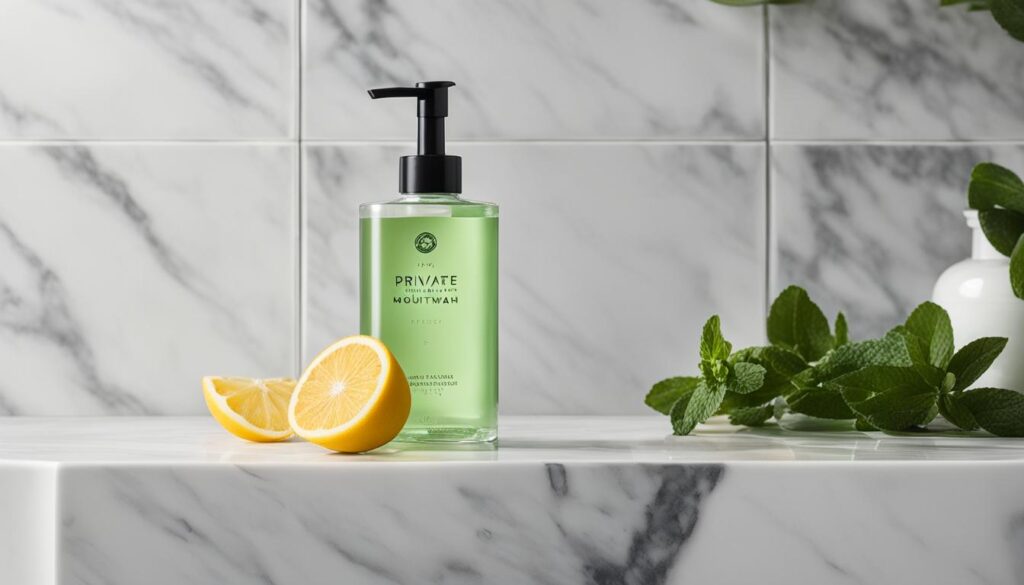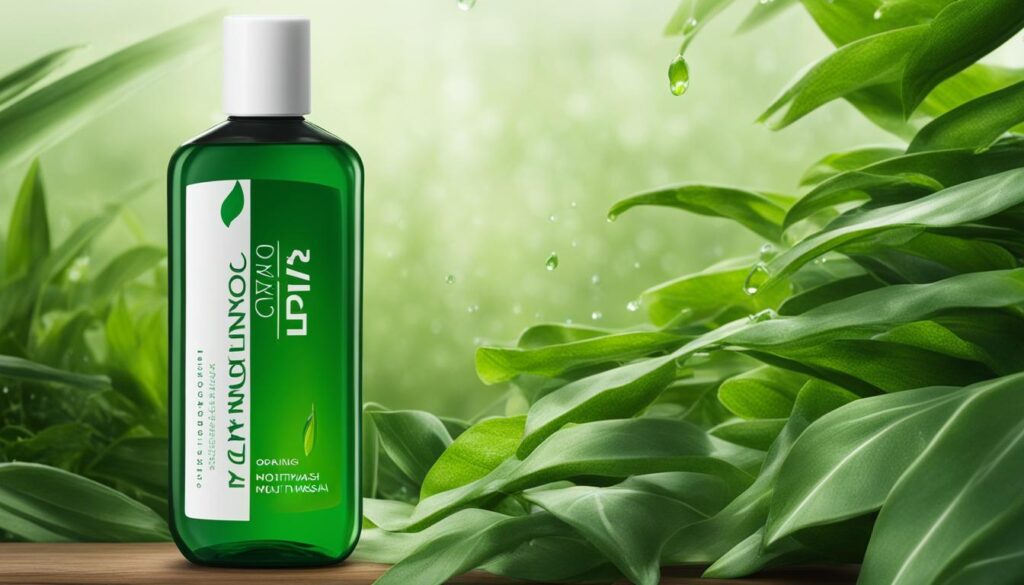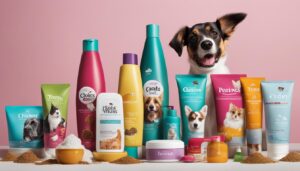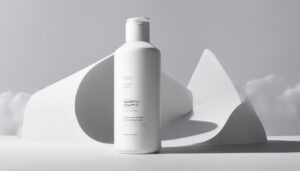Are you tired of offering the same old mouthwash products to your customers? Want to stand out in the oral care market? It’s time to consider private labeling! By partnering with an organic private label mouthwash supplier, you can bring the power of customization and exclusivity to your brand.
Private labeling allows retailers like you to have products manufactured based on your specifications and sell them under your own brand name. And when it comes to mouthwash, going organic is the way to go. Not only does it align with the increasing demand for natural and eco-friendly products, but it also offers unique benefits for your brand’s success.
When you choose an organic private label mouthwash supplier, you ensure that your products are made using high-quality, natural ingredients. This not only caters to the growing consumer preference for organic products but also contributes to a healthier oral care routine.
Key Takeaways:
- Private labeling allows retailers to sell products under their own brand name.
- Organic private label mouthwash offers customization and exclusivity.
- Choosing an organic private label mouthwash supplier ensures high-quality, natural ingredients.
- Consumers are increasingly looking for organic and eco-friendly oral care products.
- Private labeling offers a unique opportunity to stand out in the market and cater to consumer preferences.
What is Private Labeling?
Private labeling is a popular business strategy where one company manufactures products and sells them under another company’s brand name. This allows retailers to offer exclusive products to their customers and expand their product catalogs without the need for large-scale manufacturing facilities.
Private label products are everywhere, from grocery store shelves to online marketplaces. Retailers use private labeling to introduce their own unique products, differentiate themselves from competitors, and build brand loyalty. With private label products, retailers have more control over the quality, pricing, and marketing of their offerings.
Private labeling works through a partnership between a retailer and a manufacturer. The retailer provides their specifications and branding guidelines, and the manufacturer produces the products according to those requirements. The manufacturer may also offer additional services such as packaging design and labeling. The retailer then markets and sells the products under their own brand name, giving them a competitive edge in the market.
What is Private Labeling?
Private labeling allows retailers to offer exclusive products under their own brand name. It is a strategic way to expand product offerings, stand out in the market, and build brand loyalty among customers. Private label products are manufactured by one company and sold under another company’s brand name. This article explores the concept of private labeling and how it benefits retailers.
Private label products are found in various industries, including food and beverage, beauty and personal care, and household goods. Retailers partner with manufacturers to develop products that meet their specific requirements. By offering private label products, retailers can differentiate themselves from competitors and provide unique offerings to their customers.
Private labeling offers numerous advantages for retailers, including higher profit margins, control over product quality, and the ability to customize pricing and marketing strategies. It also allows retailers to quickly adapt to market trends and consumer preferences. With private label products, retailers can build a strong brand identity and establish a loyal customer base.
The Benefits of Private Labeling
Private labeling offers numerous advantages for both manufacturers and retailers. It allows retailers to create unique products that differentiate them from competitors and build customer loyalty. With private labeling, retailers have the opportunity to set higher profit margins compared to selling branded products, as they have control over the manufacturing costs and can customize pricing strategies. This means increased revenue and greater profitability for their businesses.
One of the key benefits of private labeling is the ability to customize and control the entire product development process. Retailers can work closely with manufacturers to create products that meet their specific requirements and standards. From formulation to packaging design, private labeling allows for complete customization, resulting in products that are tailored to the target market and aligned with the retailer’s brand identity.
Private labeling gives retailers the freedom to set their own pricing and create compelling marketing campaigns that resonate with their target audience. By leveraging their brand reputation and unique selling propositions, retailers can effectively position their private label products in the market, driving increased sales and market share.
Another advantage of private labeling is flexibility. Retailers can quickly adapt to market trends and consumer demands by introducing new products or modifying existing ones. This agility allows them to stay ahead of competitors and capitalize on emerging opportunities. Additionally, since private label products are exclusive to the retailer, they reduce reliance on outside suppliers and increase control over the supply chain.
In summary, private labeling provides retailers with a multitude of benefits, including product differentiation, increased profitability, customization, flexibility, and greater control over the supply chain. By leveraging these advantages, retailers can strengthen their brand, expand their product offerings, and ultimately drive business growth.
Examples of Private Label Products
Private label products have become increasingly popular in various industries, offering retailers the opportunity to offer unique and exclusive items under their own brand. Let’s take a look at some examples of private label products in different categories:
Private Label Coffee
Many retailers have embraced private label coffee to offer their customers a distinctive coffee experience. Notable examples include:
| Brand | Description |
|---|---|
| Cafe Delights | A premium range of fair-trade organic coffee beans sourced from the finest coffee plantations around the world. |
| Wake Up Roasters | A collection of bold and flavorful coffee blends, meticulously crafted to satisfy even the most discerning coffee lovers. |
Private Label Pet Food
When it comes to pet food, private label brands have made significant strides in offering high-quality and nutritionally balanced options for our furry friends. Some notable private label pet food products include:
- Paws & Whiskers: A premium line of grain-free cat food made with real meat and essential nutrients to support feline health.
- Doggy Delights: A range of natural dog treats made with wholesome ingredients, providing a tasty and guilt-free reward for your canine companion.
Private Label LED Lights
Private label LED lights have gained popularity due to their energy efficiency and longevity. Here are a few examples of private label LED light products:
| Brand | Description |
|---|---|
| BrightLite | An extensive range of energy-saving LED bulbs and fixtures, perfect for illuminating any space with a bright and eco-friendly glow. |
| LightTech | A premium collection of dimmable LED lights that offer both functionality and ambiance, allowing you to create the perfect lighting atmosphere. |
These examples illustrate how private label products can provide retailers with unique offerings that cater to specific customer preferences. By partnering with the right suppliers and focusing on quality, retailers can create memorable and successful private label brands.
How to Start Your Own Private Label Mouthwash
If you’re looking to enter the oral care market and create your own private label mouthwash, you’ve come to the right place. Starting your own private label mouthwash business can be a lucrative venture, but it requires careful planning and execution. Here’s a step-by-step guide to help you get started:
- Research the market: Before diving into the private label mouthwash industry, it’s crucial to conduct thorough market research. Identify your target audience, analyze competitor products, and determine market trends and demands.
- Develop a unique formulation: Differentiate your private label mouthwash by creating a unique formulation. Consider ingredients that promote oral health and freshness, such as essential oils, xylitol, aloe vera, and hydrogen peroxide. This will help your product stand out in the market.
- Design appealing packaging: Invest in eye-catching packaging that reflects the quality of your private label mouthwash. A well-designed label can attract customers and convey the benefits of your product.
- Choose a reliable manufacturer: Find a reputable manufacturer specializing in private label oral care products. Ensure they meet strict quality standards and have experience in producing mouthwash.
- Obtain necessary certifications: To establish credibility and ensure regulatory compliance, obtain necessary certifications such as FDA approval and Good Manufacturing Practices (GMP) certification.
- Develop your brand: Build a strong brand identity for your private label mouthwash. Create a compelling brand story, logo, and marketing materials that resonate with your target audience.
- Launch and market your product: Finally, plan a successful product launch and implement a strategic marketing campaign. Utilize various channels, including social media, influencers, and online advertising, to reach your target customers.
By following these steps, you’ll be well on your way to establishing your own successful private label mouthwash business and offering a unique product to consumers.

Ingredients Ideas for Private Label Mouthwash
When formulating your private label mouthwash, it’s important to choose ingredients that not only promote oral health but also provide an excellent user experience. Consider incorporating the following ingredients into your mouthwash:
- Essential oils: Add essential oils like peppermint, spearmint, or tea tree oil to give your mouthwash a refreshing taste and aroma.
- Xylitol: Known for its cavity-fighting properties, xylitol can help reduce the risk of tooth decay.
- Aloe vera: Aloe vera has soothing properties and can help alleviate gum inflammation and irritation.
- Hydrogen peroxide: Hydrogen peroxide acts as an antiseptic and can help kill bacteria that cause bad breath.
Additionally, you may consider incorporating other beneficial ingredients like green tea extract, fluoride, and cetylpyridinium chloride (CPC) to further enhance the effectiveness of your mouthwash.
Ingredients Ideas for Private Label Mouthwash
When it comes to creating your own private label mouthwash, the choice of ingredients is crucial. Not only do they need to promote oral health, but they also play a significant role in providing an excellent user experience. Here are some ingredient ideas that can elevate your private label mouthwash formulation:
1. Essential Oils
Essential oils not only add a refreshing flavor to mouthwash but also offer specific benefits such as antimicrobial properties. Peppermint, spearmint, and tea tree oil are popular choices that can help freshen breath and combat bacteria in the mouth.
2. Xylitol
Xylitol is a natural sugar substitute that not only sweetens the mouthwash but also helps reduce the risk of tooth decay. It inhibits the growth of harmful bacteria in the mouth and promotes a healthier oral environment.
3. Aloe Vera
Aloe vera is known for its soothing and healing properties. Adding aloe vera to your mouthwash formulation can help soothe gum irritation, reduce inflammation, and promote overall oral health.
4. Hydrogen Peroxide
Hydrogen peroxide is a powerful ingredient that can provide effective teeth whitening and stain removal. It helps eliminate bacteria and prevent the buildup of plaque, leading to a brighter smile.
| Ingredient | Benefits |
|---|---|
| Essential Oils | Antimicrobial properties, freshens breath |
| Xylitol | Reduces risk of tooth decay, inhibits bacterial growth |
| Aloe Vera | Soothes gum irritation, reduces inflammation |
| Hydrogen Peroxide | Teeth whitening, stain removal, prevents plaque buildup |
These are just a few suggestions for ingredient ideas in your private label mouthwash formulation. Get creative and experiment with different combinations to create a unique product that not only delivers oral health benefits but also delights your customers with its effectiveness and taste.
Conclusion
In today’s competitive market, private labeling is the secret sauce to success for retailers. By partnering with an organic private label mouthwash supplier, you can build your brand and offer customers unique products they won’t find anywhere else.
A well-crafted private label mouthwash formulated with quality ingredients like essential oils, xylitol, and aloe vera, not only promotes oral health but also sets your brand apart from the rest.
So why settle for ordinary when you can create extraordinary? Start your own private label mouthwash business today, and let your brand leave a lasting impression on customers. Explore the endless possibilities of private label oral care products and watch your business flourish!
FAQ
What is private labeling?
Private labeling refers to products manufactured by one company and sold under another company’s brand name.
Why should I consider private labeling for my brand?
Private labeling offers advantages such as creating unique products, setting higher profit margins, customizing pricing and marketing, and quickly adapting to market changes.
What are some examples of private label products?
Private label products can be found in various industries, including coffee, pet food, LED lights, phone accessories, apparel, smart backpacks, and personal care products.
How can I start my own private label mouthwash business?
To start your private label mouthwash business, you need to research the market, develop a unique formulation, design appealing packaging, choose a reliable manufacturer, obtain necessary certifications, develop your brand, and effectively launch and market your product.
What are some recommended ingredients for a private label mouthwash?
Ingredient ideas for a superior mouthwash formulation include essential oils, xylitol, aloe vera, hydrogen peroxide, green tea extract, fluoride, and cetylpyridinium chloride (CPC).
Why should I choose an organic private label mouthwash supplier?
Choosing an organic private label mouthwash supplier ensures that your product promotes oral health and stands out in the market.





